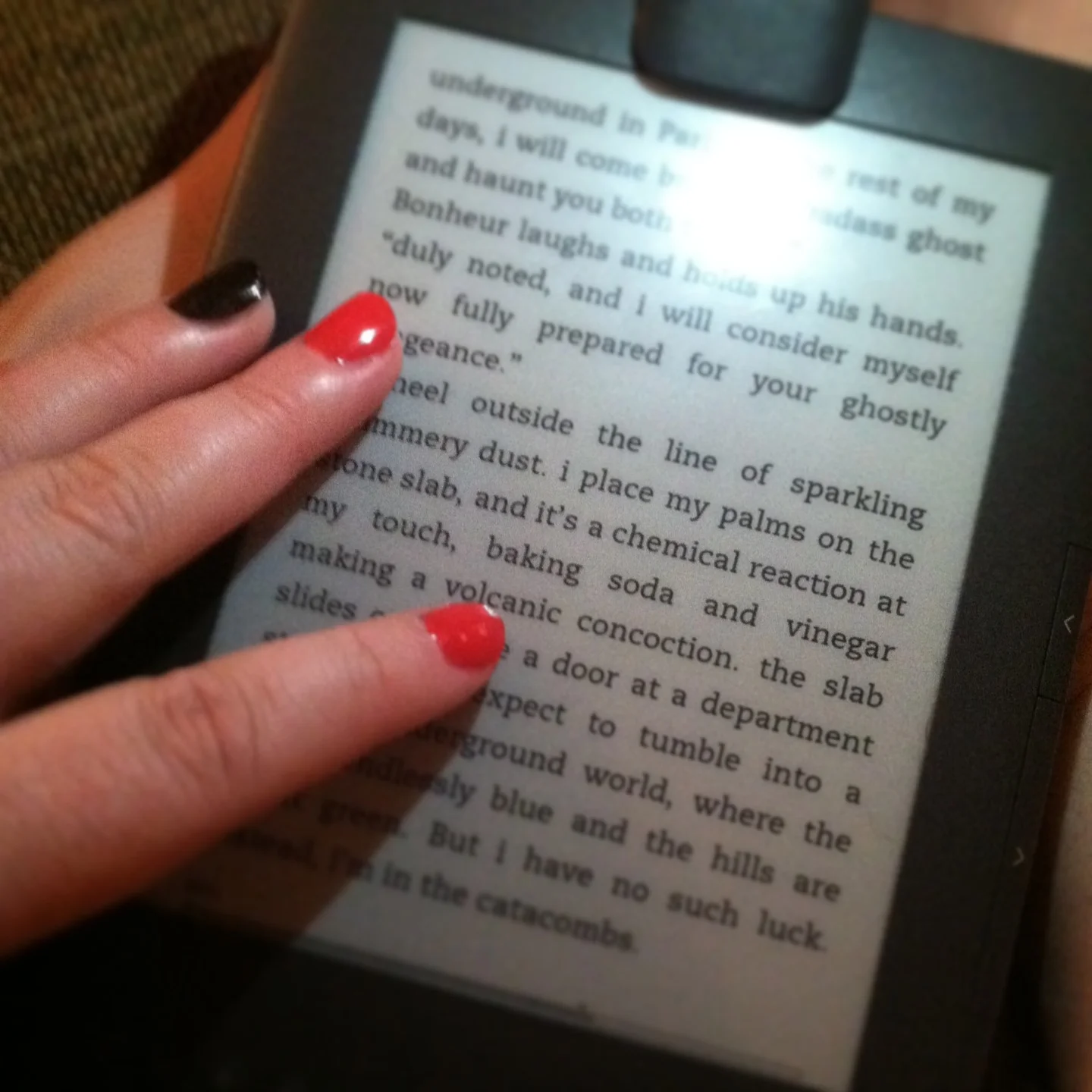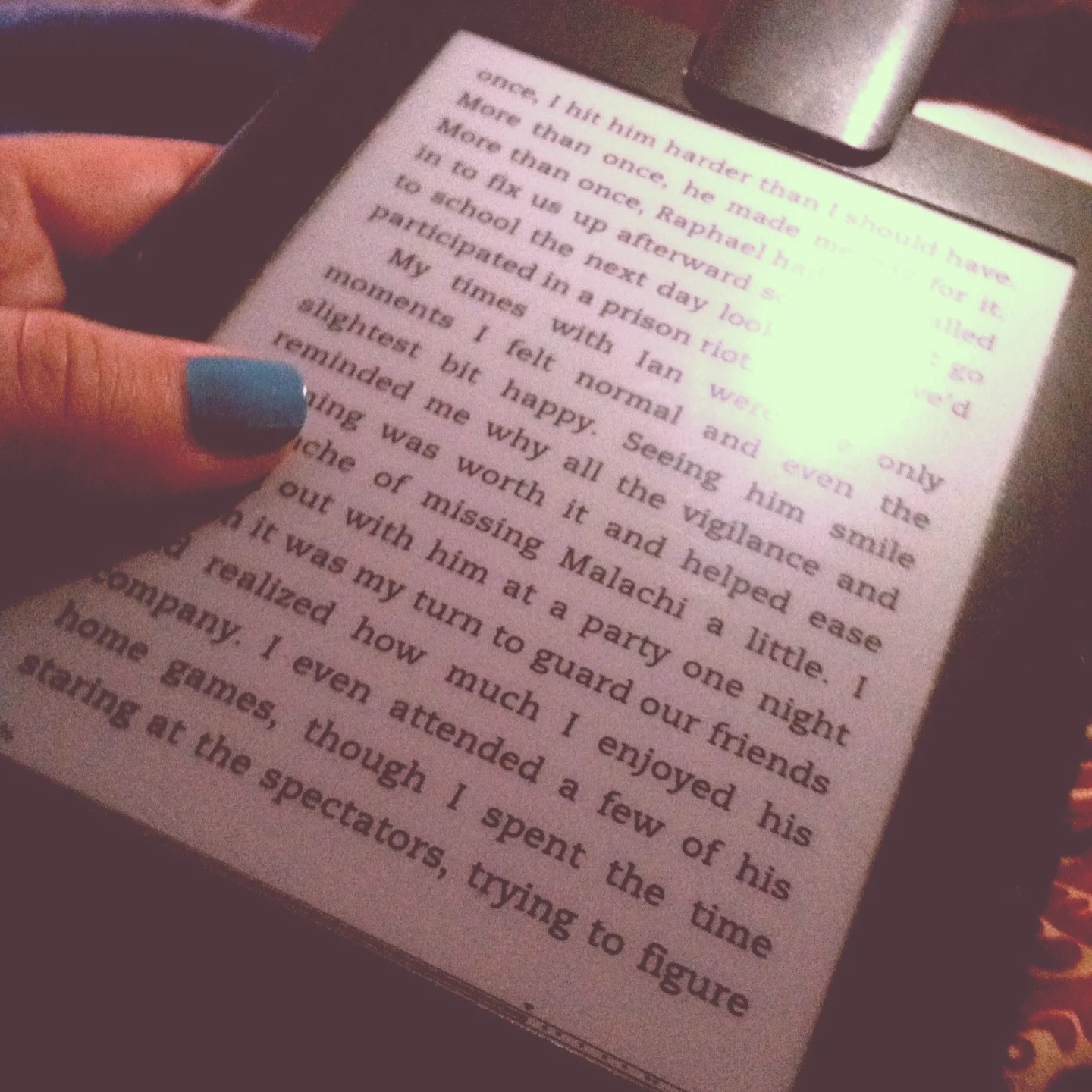A Surprising, Satisfying Sequel: Fractured by Sarah Fine
“It was a reminder of what we’d lost—and also that my senior year was rapidly coming to a close. I’d barely noticed. Prom was in three weeks, and graduation was only a month after that. It was hard to believe that a few months ago, I’d assumed I’d be here with Nadia, enjoying all of this. Now that Nadia was gone, I had nothing to look forward to except the hope that I could prevent a bunch of evil spirits from overrunning Rhode Island. ”
Sarah Fine's Sanctum was a real surprise when I discovered it earlier this year. It had all the things I love about adult fantasy--grit, flawed characters, adventure, big consequences--in a compelling young adult package. Needless to say, I eagerly anticipated the sequel, Fractured.
[Tiny spoilers for Sanctum ahoy, though I've attempted to be as vague as possible.]
Fractured picks up shortly after Sanctum ended, which narrator Lela back home in Rhode Island. We find the power dynamics between she and love interest and Shadowland Guard Malachi have shifted. She's the boss, with a crew of guardians under her command. They're battling the demon-like mazikin, as in Sanctum, but this time they're on Lela's home turf, and the few people she's allowed to become close to her are all in danger, making the stakes even higher than before.
“Life as it was now: a weird intersection of normal and crazy, of life and beyond-life, afterlife, undead, whatever. I put my hand to my heart and felt it beating, remembered feeling Malachi’s pounding through his shirt as he kissed me. Were we alive? Were we here on borrowed time? Did we have a right to live or only to serve as Guards? Did we have a future, or were we headed back to the dark city when we were done? Did anything we did here, apart from eliminating the Mazikin, matter? Could we keep anything for ourselves?”
Second books in a series are a tough thing. In a lot of ways, when a first book is good, the second book's role as the second act in a three-act series (as in the case of a trilogy) can feel more like a bridge to the conclusion rather than a gripping story. Fortunately, Fractured avoided this fate, and is--in many ways--a stronger book than the first.
Shifting the setting from the Shadowlands to modern-day Rhode Island was a bold move, since it radically altered the character dynamics, and it really paid off.
Podcast #15: Great (Reading) Expectations
We're excited to bring you another episode of the Clear Eyes, Full Shelves podcast! We have such a good time recording the show and love that the podcast lets us dig into issues with more nuance than the blog format allows.
In episode #15, Laura and I dig into the subject of reader expectations, the role of marketing in informing those expectations and the way consumers of creative works become intensely invested in those works. Please note, this episode was recorded prior to my writing this blog post; if it had been, we likely would have elaborated more regarding the notion of how we read, and if readers "owe" authors anything in that respect.
As always, you can listen to the podcast by streaming on this page, downloading the MP3 below or by subscribing in iTunes. If you're an iTuner, we very much appreciate your rating and reviewing the podcast, as it helps us to show up in iTunes searches. We're also now on Stitcher Radio, so if you prefer that app, you can subscribe here.
Reader Expectations & Authorial Intent: What Matters?
Laura and I recorded a podcast on Monday which will be up on iTunes (Don't forget to rate us, yo!) and blog in the next few days in which we discuss the topic of reader expectations and reactions, particularly in the context of series and authors with large backlists. While Laura and I go in depth into the topic on that podcast, I know not everyone listens to it, and the discussion just keeps morphing online.
The reader expectations discussion erupted earlier this year when Charlaine Harris finally ended her Sookie Stackhouse series. Readers were unhappy that they'd invest 13 years into reading the series, watched Sookie float from love interest to love interest and finally end up with a partner who was, to them, rather unexciting.
Then we had the whole Divergent debacle in which some readers were incredibly upset about the choices author Veronica Roth made in the final book in that series, Allegiant.
More recently, Gayle Forman has been criticized by readers frustrated with the companion novel to Just on Day, Just One Year.
And there was also the brouhaha in the romance world because an author and reader (because--shocker--people can be both) "live tweeted" her reading of Susan Elizabeth Philips' Nobody's Baby But Mine (Janet detailed this on Dear Author earlier this week).
This type of response isn't anything new, and it's not exclusive to reading.
The Sly Subversiveness of Molly O'Keefe's Wild Child
It's no secret that Molly O'Keefe's novels are my favorites in the very crowded contemporary romance genre. Her books, which on their surface follow the norms of romance novels (since that's what they are), are brilliantly subversive. All of the novels I've read by this author riff on romance archetypes and conventions in a deliciously satisfying manner. Molly's latest, Wild Child, is no different.
Wild Child focuses on Monica Appleby, famous reality television teen wild child, who wrote a bestselling tell-all memoir of her raucous and destructive formative years. She's alone, her closest friend having recently died and not having a relationship with her mother, and has returned to the town of Bishop, Arkansas to write her follow-up book, this time chronicling the events of her parents' tumultuous relationship and her father's subsequent death. Monica is all hard edges and walls, unwilling to make even casual connections with anyone.
Monica ignored Jackson as he slid into the booth across from her. First the Cracker dude and now Jackson. Good Lord, weren’t the headphones a giveaway? Did she need to make a Do Not Disturb sign? This was why she so rarely went to coffee shops to work, preferring her own company and her own music.
The mayor of Bishop is Jackson Davies, who dropped out of law school and returned to his hard-luck hometown to raise his younger sister, Gwen, after their parents were killed in a car accident. Jackson never wanted to make Bishop his home; the town is dying, with an empty factory gathering dust and many of the town's residents struggling in the blighted economy. His father was mayor of Bishop as well, and his goal at the town's leader is the turn the economy around, make sure his sister is safely away at college and then get out of town.
Podcast 14: What's Love Got to Do with It? YA & Romance with Author Robin Benway
In this episode of our podcast, we dig into the topic of romance and fiction for teens with author Robin Benway. This is an interesting topic, as there are, well, complicated.
Robin is the author of Audrey, Wait!, The Extraordinary Secrets of April, May & June, and Also Known As, which was released in February 2013. The sequel to Also Known As, Going Rogue, will be out in early 2014. She lives in Los Angeles with her shih tzu, Hudson.
You can learn more about Robin by visiting her website or by following her onFacebook or Twitter.
As always, you can listen to the podcast by streaming on this page, downloading the MP3 below or by subscribing in iTunes. If you're an iTuner, we very much appreciate your rating the podcast, as it helps us to show up in iTunes searches. We're also now on Stitcher Radio, so if you prefer that app, you can subscribe here.
12 Tiny Reviews
I have a ton of posts and reviews in various stages of completion, but my real-life (paying) work just keeps getting in the way of my actually finishing anything. So, I thought I'd post a bunch of rapid-fire tiny reviews. Items with an asterisk (*) are currently planned for a longer post.
Unraveling & Unbreakable by Elizabeth Norris (Audiobooks)
This series was a wonderful surprise, full of action and an authentic teenage voice. I loved that despite that it's a very plot-heavy story, lots of different types of relationships are explored as well.









